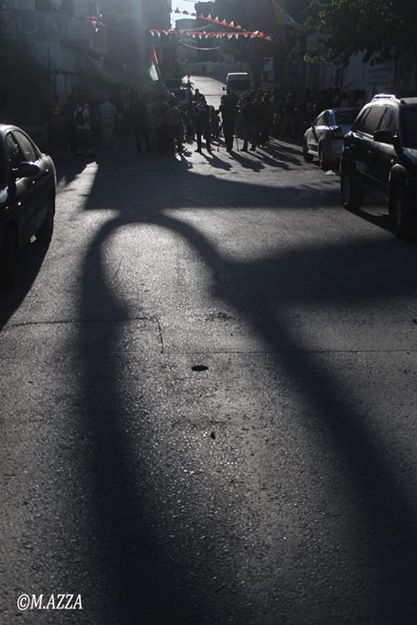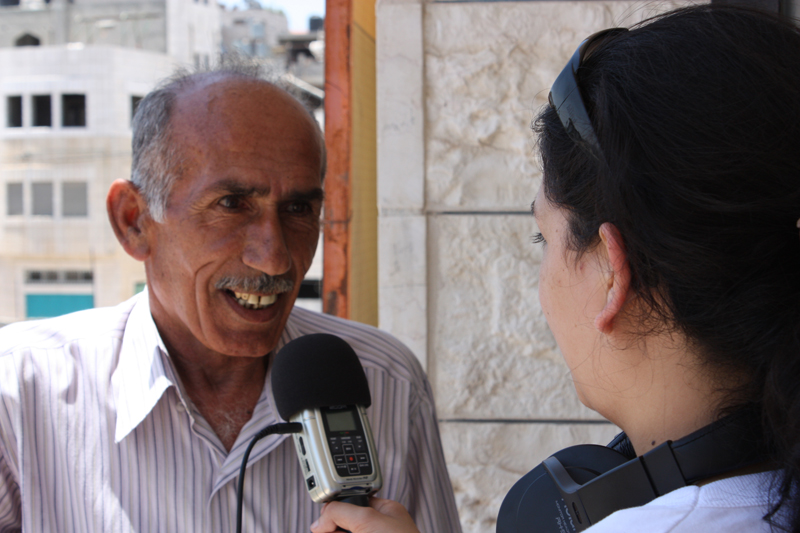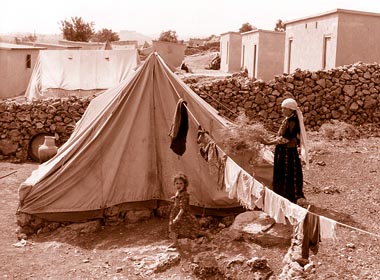LAYAN AZZA: Hi, I’m Layan Azza. One of the Radio Lajee team. I’m 18 years old and have lived in Aida Refugee Camp all my life. It was established in 1950 and has changed a lot.
My grandfather, now 75 years old, was one of the first refugees to arrive here. He was 14 years old.
How long have you been living in the camp?
MOHAMAD AZZA (Layan’s Grandfather): Around 60 years.
LAYAN AZZA: Can you describe what Aida Camp looked like when you first arrived?
MOHAMAD AZZA: The camp was just a piece of land…Some trees and big rocks. And every family, they had a tent from UNRWA and they built it and they put the stones around the tent.
It was very hard for us, especially in the winter. Some nights it would snow and the tent [would] fall down on the family…on the kids and the family. And maybe some head of that family [would spend] all the night holding the tent, till the morning.
LAYAN AZZA: What did you take to camp with you from your home in Beit Jibreen?
MOHAMAD AZZA: We didn’t take anything…heavy things. We took our dress, special dresses…and some mattresses and covers…to cover us and our kids during the night when we were walking from our village to Hebron. We walked from our village to Hebron [over] 2 nights and we had some mattresses and covers only. We couldn’t carry anything heavy because we didn’t have any cars with us or anything. Because we were thinking maybe we’ll return back after 2 days, 3 days, a week…2 weeks.
LAYAN AZZA: Did you get your keys to your home?
MOHAMAD AZZA: Yes, it was with my mother and father. The key means to me that I have to return to my home, to my village, to my land…one day. I hope that.
LAYAN AZZA: How was the situation here? What sort of life did people have here in The Camp?
MOHAMAD AZZA: The situation was very, very hard for the people. There was no work. They don’t have money. They didn’t have any food – they didn’t have anything. Except what UNRWA gave them. In the first ten – fifteen years, they gave the people every month some flour, rice and sugar or something. That’s it. People were poor, they were very sad living in their tents. They can’t go out because they don’t have any anything with them.
LAYAN AZZA: You were still a kid at school when you came here, so…were there any classes or teaches in the camp?
MOHAMAD AZZA: We had teachers…but we didn’t have any chairs, any desks, any things…We sat on the earth – on the ground. Around 3 or four years [were] like this. And after that, UNRWA started to bring chairs and desks to the students and big tents.
LAYAN AZZA: That was my Grandfather, talking about The Camp when he arrived 60 years ago.
[Sound of kids playing in the school courtyard]
Now it’s different; we have 2 schools: one for the boys and one for the girls. We don’t live in tents anymore. Now we have houses and electricity. Some people have satellite TV and a few people have internet. Water? Water is still a big problem…But, it is also a big story – for another time.
When my Grandfather came here there were around 160 people…but now, we have around 5000 people living in the same space. So we are crowded!
I hate living in the camp because I know my family once had land. But now, somebody else is living on that land.




